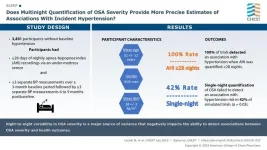(Press-News.org) Self-reported data from lesbian, gay or bisexual (LGB) patients shows these groups have poorer health outcomes compared to those who identify as heterosexual, but bisexual people disproportionally experience the worst outcomes in England.
These new findings, published today in the peer-reviewed journal The Journal of Sex Research, indicate that bisexual people face additional health disparities within an already marginalised community.
Experts, from the Brighton and Sussex Medical School and Anglia Ruskin University who led the analysis of more than 835,000 adults in England, suggests the disparities could result from unique prejudice and discrimination that can come from both mainstream society and LGBTQ+ communities.
“Minority stress could put bisexual individuals at increased risk of psychological problems and negative behaviours – and ultimately at greater risk of poorer health outcomes,” explains lead author Professor Carrie Llewellyn, Head of the Department of Primary Care & Public Health at Brighton and Sussex Medical School.
“Our results suggest that there is a greater prevalence of long-standing physical health conditions amongst people identifying as LGB. Furthermore, nearly all LGB individuals across all gender responses in the survey felt less confident in managing their own health.”
Llewellyn, a Professor of Applied Behavioural Medicine a behavioural scientist and a Chartered Psychologist, adds: “While it is well-established that persistent health disparities exist among LGB patients, very little is known about the specific experiences of bisexual people.
“Our study goes some way to addressing this gap – finding that bisexual people, especially women, have the worst experiences in healthcare and the worst health outcomes of any sexuality.”
The team’s study used data from 836,312 adults – including 23,834 people who identified as LGB or ‘other’ – from Ipsos MORI’s 2015/16 English General Practice Patient Survey (GPPS), which collects health data from approximately 1% of the adult English population each year.
They compared the health outcomes of people identifying as LBG with heterosexual groups through their self-reported quality of life, physical and mental health, and confidence in managing their own health. After adjusting the data to account for age, ethnic group, working status and socioeconomic status, they found that:
Long-term physical and mental health problems were more than twice as likely to be reported for people within LGB groups compared to heterosexual groups – except for bisexual women where the odds were more than four times greater.
Bisexual women reported to be half as likely to be living without a long-term health condition.
LGB groups across the genders felt less confident in managing their own health and experienced significantly worse quality of life compared to heterosexuals.
“It is important to recognise that interventions addressed to the LGB population as a whole may neglect the needs of subgroups further marginalised within this community, such as bisexual people,” adds Professor Carrie Llewellyn.
“A better understanding of the different spectrum of health needs across LGBTQ+ subpopulations is required to provide adequate and equitable healthcare services for all.
“Modification of healthcare settings to increase perceived accessibility and providing services that better meet these specific health needs are essential.”
This cross-sectional dataset had a population sampled from 99% of the adult population in England, which is a key strength of this study. However, it cannot separate marginalised sexual orientations who are cisgender, transgender and non-binary due to limitations with the survey design at the time of data collection (2015/16). It also relies on the self-reporting of health conditions by patients, which may not be clinically diagnosed or accurate.
END
Bisexual people experience worse health outcomes than other adults in England – national study of more than 835,000 people
2023-07-25
ELSE PRESS RELEASES FROM THIS DATE:
Family loses child to necrotizing enterocolitis and publishes “Forever Our Little One,” a storybook for bereaved families
2023-07-25
Davis, CA – Mother-daughter duo Jennifer Canvasser and Leslie Napolitano have published Forever Our Little One, a storybook for bereaved families. Jennifer is the executive director of the Necrotizing Enterocolitis (NEC) Society, which she founded after her son Micah tragically died from complications of NEC. Leslie is an artist and illustrator who helped care for her grandson Micah during his time in the neonatal and pediatric intensive care units. Jennifer wrote the storybook for families ...
Curbing waste improves global food security but has limited environmental benefits
2023-07-24
Irvine, Calif., July 24, 2023 – Reducing waste is one way to help combat hunger around the world, but stricter control over food loss and waste does not lead to better environmental outcomes, according to researchers at the University of California, Irvine and the University of Colorado Boulder.
In a paper published recently in Nature Food, the scientists stress that curbing food spoilage increases the amount of produce in markets, which leads to lower costs. Cheaper food encourages people to buy and eat more, offsetting the lowering of greenhouse gas ...
Highlights from the journal CHEST®, July 2023
2023-07-24
Glenview, Illinois – Published monthly, the journal CHEST® features peer-reviewed, cutting-edge original research in chest medicine: Pulmonary, critical care and sleep medicine and related disciplines. Journal topics include asthma, chest infections, COPD, critical care, diffuse lung disease, education and clinical practice, pulmonary vascular disease, sleep, thoracic oncology and the humanities.
The July issue of the CHEST journal contains 49 articles, including clinically relevant research, reviews, case series, commentary and more. Each month, the journal ...
New study reveals self-replicating RNA and novel vaccine delivery technology demonstrate enhanced safety and efficacy
2023-07-24
As the world continues to combat various infectious diseases, the development of novel vaccine technologies remains at the forefront of scientific research. mRNA-based vaccines and utilization of lipid nanoparticles (LNPs) for their delivery, have recently shown encouraging results in diseases such as COVID-19.
However, a critical concern revolves around the wide biodistribution of LNPs in the body, which, in some cases, may result in unintended side effects. A recent publication in the peer-reviewed ...
Often, consumers inadvertently give too much credit to products’ ‘scientifically studied’ claims
2023-07-24
Key takeaways
A new study finds that consumers often misremember if a product is labeled “scientifically studied” or “scientifically proven” — despite the significant difference in meaning between the two phrases.
UCLA psychologists conducted an experiment with one group of college students and another group of older adults to determine whether they would accurately recall which claim was made in an advertisement for a dietary supplement.
Only 26% of subjects correctly remembered which phrase was used, and the percentage who recalled the information ...
ACP says the US needs immediate action to prepare for future pandemics
2023-07-24
Embargoed for release until 5:00 p.m. ET on Monday 24 July 2023
Annals of Internal Medicine Tip Sheet
@Annalsofim
Below please find summaries of new articles that will be published in the next issue of Annals of Internal Medicine. The summaries are not intended to substitute for the full articles as a source of information. This information is under strict embargo and by taking it into possession, media representatives are committing to the terms of the embargo not only on their own behalf, but also on behalf of the organization they represent.
----------------------------
1. ...
Community health workers improved homebound care during pandemic
2023-07-24
SAN ANTONIO (July 24, 2023) — Staying healthy and connected was difficult for everyone during the COVID-19 pandemic, but especially so for homebound older patients and their caregivers. Fortunately, a program developed by the geriatrics and supportive care team of The University of Texas Health Science Center at San Antonio effectively integrated community health workers (promotores de salud in Spanish) into patient outreach to improve health. Thanks to the program, annual visits to older adults with type 2 diabetes, dementia and other health issues in underserved ...
Stretchy integrated electronics may be possible with sandwiched semiconductor
2023-07-24
UNIVERSITY PARK, Pa. — There’s a barrier preventing the advent of truly elastic electronic systems, the kind needed for advanced human-machine interfaces, artificial skins, smart health care and more, but a Penn State-led research team may have found a way to stretch around it.
According to principal investigator Cunjiang Yu, who holds is the Dorothy Quiggle Career Development Associate Professor of Engineering Science and Mechanics and of Biomedical Engineering at Penn State, fully elastic electronic systems require flexibility and stretchability in every ...
Water-scarce cultures value long-term thinking more than their water-rich neighbors do
2023-07-24
Water is the world’s most valuable natural resource. Although a human can survive weeks or even months without food, going as little as three days without water could spell the end. The effects of water scarcity aren’t limited to immediate survival situations, however. Recently published research in Psychological Science suggests that cultures from water-scarce environments tend to be more likely than cultures from water-rich areas to value long-term thinking and to scorn short-term indulgence.
“Individuals from historically water-scarce climates tend to be ...
New method for noninvasive detection of circulating tumor cells in blood
2023-07-24
Metastasis occurs when cancer cells acquire the ability to spread and form new tumors in different places in the body, usually by traveling within blood or lymph vessels. Since metastasis is a hallmark of advanced cancer and severely complicates treatment, its early diagnosis is essential. One way to do this is by looking for circulating tumor cells (CTCs) in blood samples.
However, CTCs can be very rare, and they might be completely absent in small blood samples despite being present in a patient’s bloodstream. To address this problem, researchers have developed a technique called diffuse in-vivo flow cytometry (DiFC). It involves labeling CTCs with ...



